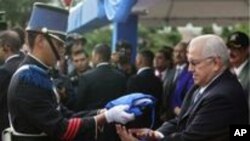<!-- IMAGE -->The people of Honduras celebrated 188 years of independence on September 15, justly proud of their country but divided over its political future.
The United States joins with them in marking the occasion, and it is hoped that the days ahead will see a return to the democratic, constitutional rule envisioned by their nation’s founder, Francisco Morazan.
Following a dispute over his attempt to change the country’s constitution, Honduran soldiers in late June executed a coup forcing President Manuel Zelaya into exile.
A de facto regime led by former head of Congress, Roberto Micheletti, has resisted the president’s efforts to return, and while there have been off-and-on talks over reaching a settlement, none has yet been achieved. The nation itself is divided over the coup, with Mr. Zelaya’s supporters and foes using Independence Day rallies to press their cause.
In light of the continued stalemate and the de facto regime’s resistance to repeated calls by both Hondurans and the international community to restore the duly elected president to office to serve the remaining few months of his term, the U.S. has cut off a broad range of assistance there. The strong measures were taken to underline the seriousness of de facto government’s actions.
"The turmoil and political differences that have divided Honduras are a source of worry and sadness," said U.S. Secretary of State Hillary Clinton.
Costa Rican President Oscar Arias has worked tirelessly to craft a process that paves the way for a return to democratic, constitutional rule, and the U.S. strongly urges all parties to reach an agreement under it.
The United States joins with them in marking the occasion, and it is hoped that the days ahead will see a return to the democratic, constitutional rule envisioned by their nation’s founder, Francisco Morazan.
Following a dispute over his attempt to change the country’s constitution, Honduran soldiers in late June executed a coup forcing President Manuel Zelaya into exile.
A de facto regime led by former head of Congress, Roberto Micheletti, has resisted the president’s efforts to return, and while there have been off-and-on talks over reaching a settlement, none has yet been achieved. The nation itself is divided over the coup, with Mr. Zelaya’s supporters and foes using Independence Day rallies to press their cause.
In light of the continued stalemate and the de facto regime’s resistance to repeated calls by both Hondurans and the international community to restore the duly elected president to office to serve the remaining few months of his term, the U.S. has cut off a broad range of assistance there. The strong measures were taken to underline the seriousness of de facto government’s actions.
"The turmoil and political differences that have divided Honduras are a source of worry and sadness," said U.S. Secretary of State Hillary Clinton.
Costa Rican President Oscar Arias has worked tirelessly to craft a process that paves the way for a return to democratic, constitutional rule, and the U.S. strongly urges all parties to reach an agreement under it.













